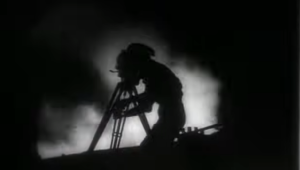Audio History

It’s easy to think of sound recordings in the present tense. Thanks to modern marketing, we’re fixated on this week’s downloads, who’s doing well on America’s Got Talent, and what Lady Gaga is wearing. (Whatever happened to that meat dress, anyway?) But a very cool thing happens once something is recorded. It stops time, and that sound event goes into a time capsule that can be used to relive the event far into the future. Let us consider these three old recordings that have recently returned to life.
- In 1963, as Air Force One carried John F. Kennedy’s body from Dallas to Washington, D.C., a tape recorder on the flight deck captured radio communications of those onboard. Recently, 42 minutes of the recording that weren’t in government archives were made available. The tone is somber, and the voices convey a sense of disbelief. Some conversations are practical; others are sympathetic. Lyndon Johnson consoles Rose Kennedy, JFK’s mother, saying, “I wish to God there was something I could do.” She responds, “Thank you very much. I know you loved Jack. And he loved you.” The tapes help us recapture, and understand, those terrible events. The recording can be heard at the Government Printing Office and via Wikimedia Commons — but note that nearly 2 hours of the original tape are still missing.
- The FBI kept an 800-page file on Alan Lomax. It stated, “Neighborhood investigation shows him to be a very peculiar individual in that he is only interested in folk lore music, being very temperamental and ornery.” What the Bureau didn’t recognize was that Alan Lomax was the premier folklorist and ethnomusicologist of the 20th century. He traveled America and the world, recording thousands of songs and interviews. These legendary field recordings helped document the work of artists such as Leadbelly, Muddy Waters, Jelly Roll Morton, and Woody Guthrie. He preserved cultural history that probably otherwise would have been lost. Lomax (1915–2002) was the first to envision a global jukebox, and now his life’s work is being made available for free online streaming. The Association for Cultural Equity’s ACE archive offers nearly 17,000 streaming recordings as well as photographs and other materials. For example, check out the prison work songs that Lomax recorded at the Parchman Penitentiary in 1947–48, cue up “Prettiest Train,” and try to imagine the daily lives of these prisoners working on the chain gang.
- Also listen to Bruce Springsteen’s new album, Wrecking Ball; two of its songs — “Death to My Hometown” and “Rocky Ground” — contain samples from the Lomax archive. To learn more, check out the article Lomax wrote for the May 1960 issue of S+V’s early predecessor, HiFi/Stereo Review, pictured above and available for perusal at culturalequity.org.
- If we dive even deeper into history, some wax cylinders were found in Thomas Edison’s lab in a wooden box behind a cot where Edison napped. (I’m not kidding.) The newly retrieved sounds from these recordings from 1889 and 1890 give us the voices of German Chancellor Otto von Bismarck and his military strategist, Helmuth von Moltke. Imagine this: With the latter, we can listen to the voice of someone born in 1800 — a mere 24 years after our Declaration of Independence was signed. You can hear the recordings at the Edison National Historical Park Web site, nps.gov/edis.
After all of that, my question, then, is this: Do you have an attic, a basement, or a barn? Maybe a wooden box tucked away somewhere with a cylinder, disc, or tape inside? It might be a timeless piece of history waiting to speak to you — and us. Go ahead, see what you can find.
- Log in or register to post comments






























































